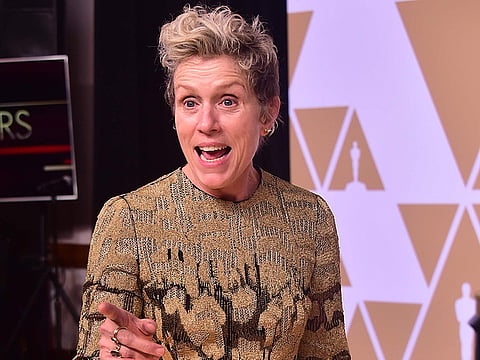Will Hollywood heed the call for diversity?
‘Best Actress’ winner Frances McDormand shone light on the Hollywood gatekeepers who decide which people and ideas to engage with

Frances McDormand stole the Oscars with an acceptance speech in which she placed her award on the floor in front of her and then asked every female nominee in the audience to stand up so that the “gatekeepers” in the room could see whom to contact about project ideas. Challenging Hollywood executives to take practical steps to tackle inequality, the best actress winner also called for inclusion riders, clauses in A-lister contracts that stipulate diversity quotas for a film’s cast and crew, using the A-list actor’s negotiating power to enforce more diverse recruitment practices.
McDormand’s powerful statement shone light on exactly the right spot: because it is with the executives and decision-makers that change needs to start, specifically the hiring and commissioning practices of a highly exclusive circle of influencers. Diversity policy and practice to date has been led by the idea that if individuals can improve their connections or skills they can succeed in the cultural professions. But that won’t bring change.
The Harvey Weinstein scandal revealed powerfully and painfully how a select handful of people — typically male and white — control opportunities for the rest of the film workforce, on and off screen. But their power, and the misuse of that power, is by no means limited to Hollywood or confined to sexual harassment. Across the arts and culture, producers and commissioners, artistic and creative directors, curators and editors, members of admissions and audition panels, A & R managers, educators, project leads and agents afford or withhold opportunities to develop talent, to pursue creative ideas and ambitions, and to earn a living. These people make crucial decisions on individual careers, from admissions into art school to internships and jobs, and crowning cultural leaders. They decide what gets produced in arts and culture, and who gets to produce it.
Post-Weinstein this shift of attention is almost revolutionary. For so long the diversity debate has been dominated by a model of individual deficiency: the idea that female, working-class and ethnic-minority workers tend to lack the connections, networks, skills or confidence to make it on the otherwise oh-so-level playing fields of the Oscars, Grammys, Turner and so on.
A study for the British Film Institute to be published this week describes this approach as focusing on “enabling initiatives”: training, networking and mentoring programmes targeted to help specific groups of workers get in and get on. These initiatives have, undeniably, opened doors for creative talent. But they have not affected how the decisions about who gets in are made.
Again, credit where it’s due: things had slowly started to change before Weinstein, for instance with initiatives such as the BFI’s diversity standards, which put the onus on businesses rather than individuals. But, as Riz Ahmad pointed out in his diversity speech to the House of Commons, pre-Weinstein such attempts to change the system had a whiff of well-intentioned but somewhat naive worthiness, of trying to engineer a socially desirable, but under business constraints also somewhat optional extra, outcome.
Weinstein has individualised the system, making it possible to single out individuals who can and should act differently. And McDormand has shown how that legacy of Weinstein can create positive change beyond sexual harassment by giving an individual face to “the system”. Inclusion riders are one possible tool. But insisting on an inclusion rider might diminish an individual actor’s chances of getting hired themselves. To really make a difference, inclusion riders would need to be established as standard and backed up by unions, so that individual actors couldn’t gain a competitive advantage by not having one in their contract.
McDormand’s other move is the more powerful one: pointing out that “the system is in the house”, that it has tangible individual representatives in the gatekeepers, and that those gatekeepers can exercise a choice over whom they talk to and whose ideas they engage with, right there and then.
Responsible gatekeeping is already making a difference in clubbing, with a new generation of promoters responding to the demand for more inclusive nights out. The screen sector, and arts and culture more broadly, need that too — and fast. Let’s see where we are come the next Oscars.
— Guardian News & Media Ltd
Dr Doris Eikhof is deputy director of CAMEo Research Institute for Cultural and Media Economies at the University of Leicester.



